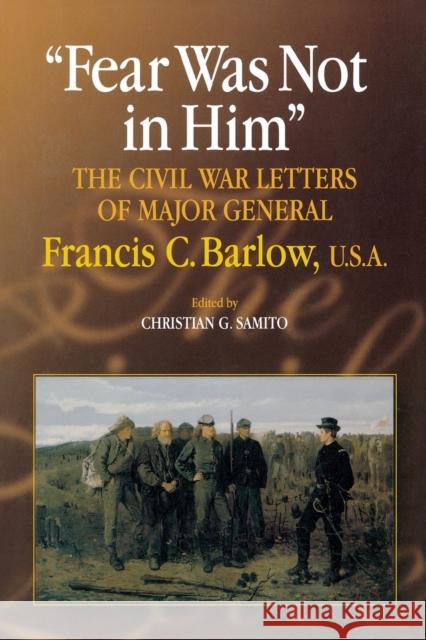Fear Was Not in Him: The Civil War Letters of General Francis C. Barlow, U.S.a » książka
Fear Was Not in Him: The Civil War Letters of General Francis C. Barlow, U.S.a
ISBN-13: 9780823223244 / Angielski / Miękka / 2006 / 312 str.
Fear Was Not in Him: The Civil War Letters of General Francis C. Barlow, U.S.a
ISBN-13: 9780823223244 / Angielski / Miękka / 2006 / 312 str.
(netto: 143,42 VAT: 5%)
Najniższa cena z 30 dni: 149,67
ok. 30 dni roboczych
Dostawa w 2026 r.
Darmowa dostawa!
Francis C. Barlow rose from lieutenant to general, suffered two serious wounds in combat, and played critical roles in such battles as Fair Oaks, Gettysburg (part of this battlefield is now named for him), and Spotsylvania. Barlow's war correspondence not only provide a rich description of his experiences in these actions but also offer insight into a civilian learning the realities of war as well as the burdens of command.Barlow was well connected with many eminent figures of his time, having spent part of his youth at Brook Farm, graduated in the Harvard College class of 1855, and had such friends as Dr. Samuel G. Howe, Ralph W. Emerson, Charles Russell Lowell, Jr., and John M. Forbes to watch over and promote his career. Winslow Homer spent considerable time with Barlow while making engravings for Harper's Weekly and later immortalized his friend in the painting, Prisoners From the Front. Barlow's letters not only offer information concerning such people but more importantly, help fill a gap in Civil War scholarship by providing a valuable window into Northern intellectual responses to the war.Jacket CopyHISTORYThrough explanatory passages and extensive notes that accompany Barlow's letters, Christian G. Samito sheds new light on the life of a major general. The letters, which span the entire war, trace the development of Northern intellectuals' perspective on the war and military life. The book illustrates how a young man, unskilled in military science, eventually became one of the North's strongest combat leaders, and a postwar politician.-Civil War Book Review Originally untrained in military science, Francis Channing Barlow ended the Civil War as one of the North's premier combat generals. He played decisive roles in historic campaigns throughout the War and his letters are classic accounts of courage combat, and the burdens of command as experienced by one of the Union's fiercest officers.Born in Brooklyn, New York, Barlow enlisted in April 1861 at the age of twenty six, commanded the 61st New York Infantry regiment by April 1862, and found himself a general in command of a division by 1863. He played a key role at Fair Oaks, Antietam, the Wilderness, Spotsylvania, and Petersburg, suffered two serious wounds in combat, and was left for dead at Gettysburg, where part of the battlefield is named after him. Barlow's war correspondence not only provides a rich description of his experiences in these actions but also offers insight into a civilian learning the realities of war.As a young intellectual, Barlow was also well connected with many eminent figures of his time. He spent part of his youth at Brook Farm, graduated first in his Harvard College class, and became a successful New York City lawyer by the time he enlisted. Among his friends he counted Ralph Waldo Emerson, Charles Russell Lowell, Jr., and Winslow Homer's family. Transformed by his experiences in the War, Barlow entered politics and served as New York's Secretary of State and Attorney General. Superbly edited by Christian G. Samito, Barlow's letters not only illuminate the life of a talented battlefield commander; they also fill a gap in Civil War scholarship by providing a valuable window into Northern intellectual responses to the War.Christian G. Samito is the editor of Commanding Boston's Irish Ninth: The Civil War Letters of Colonel Patrick R. Guiney, Ninth Massachusetts Volunteer Infantry and History of the Ninth Massachusetts Volunteer Infantry.Cover illustration: Cover design: Fordham University PressNew Yorkwww.fordhampress.com











